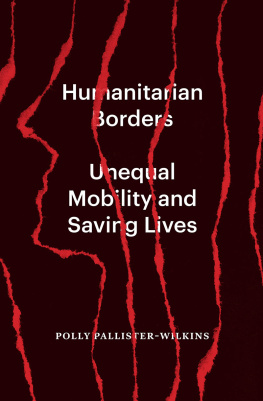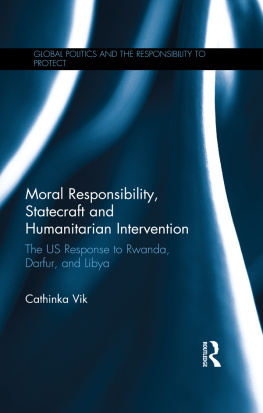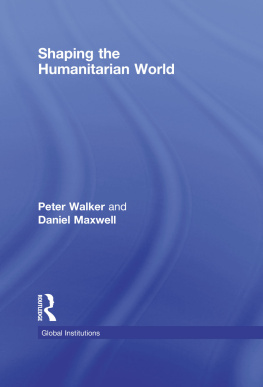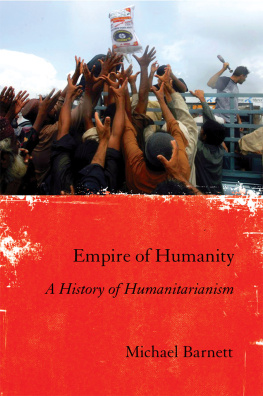Humanitarian Reason
Humanitarian Reason
A Moral History of the Present
DIDIER FASSIN
Translated by Rachel Gomme

University of California Press, one of the most distinguished university presses in the United States, enriches lives around the world by advancing scholarship in the humanities, social sciences, and natural sciences. Its activities are supported by the UC Press Foundation and by philanthropic contributions from individuals and institutions. For more information, visit www.ucpress.edu .
University of California Press
Berkeley and Los Angeles, California
University of California Press, Ltd.
London, England
2012 by The Regents of the University of California
Originally published in French as La Raison humanitaire. Une histoire morale du temps prsent, Hautes EtudesGallimardSeuil, 2010.
Library of Congress Cataloging-in-Publication Data
Fassin, Didier.
[Raison humanitaire. English]
Humanitarian reason : a moral history of the present / Didier Fassin ; translated by Rachel Gomme.
p. cm.
Includes bibliographical references and index.
ISBN 978-0-520-27116-6 (cloth : alk. paper)
ISBN 978-0-520-27117-3 (pbk. : alk. paper)
1. Humanitarian assistanceMoral and ethical aspects. 2. International reliefMoral and ethical aspects. I. Title.
HV553.F3713 2011
174'.9361dc22
2011011327
Manufactured in the United States of America
20 19 18 17 16 15 14 13 12 11
10 9 8 7 6 5 4 3 2 1
In keeping with a commitment to support environmentally responsible and sustainable printing practices, UC Press has printed this book on Rolland Enviro100, a 100% post-consumer fiber paper that is FSC certified, deinked, processed chlorine-free, and manufactured with renewable biogas energy. It is acid-free and EcoLogo certified.
To my parents
Contents
Preface to the English Edition
In the aftermath of the 2004 tsunami in Southeast Asia, Clifford Geertz commented with melancholy, in the New York Review of Books on March 24 of the following year, that fatality on such a scale, the destruction not only of individual lives but of whole populations of them, threatens the conviction that perhaps most reconciles many of us, insofar as anything this-worldly does, to our own mortality: that, though we ourselves may perish, the community into which we were born, and the sort of lives it supports, will somehow live on. One could extend this profound insight by suggesting that the significance of such a fatality is not only about our mourning of a possibly lost world, of which all traces may even disappear; it is also about our sense of belonging to a wider moral community, whose existence is manifested through compassion toward the victims. For the attentive observer of the tsunami, the impressive magnitude of the toll, with its tens of thousands of casualties, was as meaningful as the unparalleled deployment of solidarity, with its billions of dollars of aid. We lamented their dead but celebrated our generosity. The power of this event resides in the rare combination of the tragedy of ruination and the pathos of assistance. Such disasters now form part of our experience of this-worldliness, just as do aid organizations, relief operations, and humanitarian interventions. We have become used to the global spectacle of suffering and the global display of succor. The moral landscape thus outlined can be called humanitarianism. Although it is generally taken for granted as a mere expansion of a supposed natural humaneness that would be innately associated with our being human, humanitarianism is a relatively recent invention, which raises complex ethical and political issues. This book is about this invention and its complications.
Humanitarianism has become familiar through catastrophic events, the images of which have been disseminated by the media, but it has also to do with more ordinary situations closer to us. Indeed, it is a mode of governing that concerns the victims of poverty, homelessness, unemployment, and exile, as well as of disasters, famines, epidemics, and warsin short, every situation characterized by precariousness. It involves nongovernmental organizations, international agencies, states, and individuals. It mobilizes sympathy and technology, physicians and logisticians. Its sites of action are clinics for the poor and refugee camps, a social administration where undocumented immigrants are received and a military garrison where earthquake victims are treated. The case studies I have brought together here represent an attempt to account for this government of the precarious in its diversity during the past two decades. The first part involves policies and actors in France, the second explores scenes from South Africa, Venezuela, Palestine, and Iraq, with a transition following the transnational circulation between the Third World and Europe. This assemblage poses two questions.
First, how specific is the French case? It is true that important humanitarian organizations were founded in France, that French governments often included secretaries for humanitarian affairs, and that France played a prominent role in the promotion of humanitarian policies within international institutions, including the United Nations. It is obvious too that France has a long history of private charitable works emanating from Christian orders as well as public solidarity policies translated into social security, state medical aid, and most recently universal medical coverage, all elements that have resulted in a relatively distinct set of shared political and moral values. There is thus definitely a singularity of the French relationship with humanitarianism. However, the phenomena I describe and analyze in the case studies extend beyond the national boundaries in which they are inscribed. The tensions between compassion and repression, the problems posed by the mobilization of empathy rather than the recognition of rights, the prejudices toward the dominated and their consequences regarding the way to treat them have a high degree of generality that make them relevant in various contexts. Configurations may be different, but processes are similar.
Second, how coherent is the arrangement of such diverse geographical cases? The initial series of cases was situated in France and concerns its management of the disadvantaged, while South Africa, Venezuela, and Palestine yield three paradigmatic humanitarian scenesthat is, respectively, epidemics, disasters, and conflictswith the final study illustrating the ambiguous links between aid workers and armed forces in military interventions such as in Iraq. The central hypothesis that holds these various worlds together is that they are inscribed in the same humanitarian governing process, whether it deals with the poor and the undocumented in the North or AIDS orphans and flood victims in the South, with comparable moral categorizations and judgments, analogous developments of moral communities and exclusions, and equivalent consequences in terms of negation of voices and histories. Examining these distant scenes through the same lens is indispensable to comprehending the larger issues at stake in our moral economies.
The argument of this book is therefore that humanitarianism has become a potent force of our world. Its dissemination is so widespread that the tears shed by the Chinese prime minister over the devastation of the province of Sichuan increased his popularity, just as the apparent indifference of the president of the United States to the tragic consequences of Hurricane Katrina demonstrated the emptiness of his campaign slogan of compassionate conservatism. Its invocation is so powerful that it can serve as grounds for military action, allegedly to protect endangered populations, sometimes foregoing alternative options as in Kosovo or forging evidence as in Kuwait, or can even be used, as in the case of Augusto Pinochet in Britain and Maurice Papon in France, to exempt individuals accused or convicted of crimes against humanity from facing justice and punishment. It is this global and yet uneven force that I attempt to analyze here.
Next page












